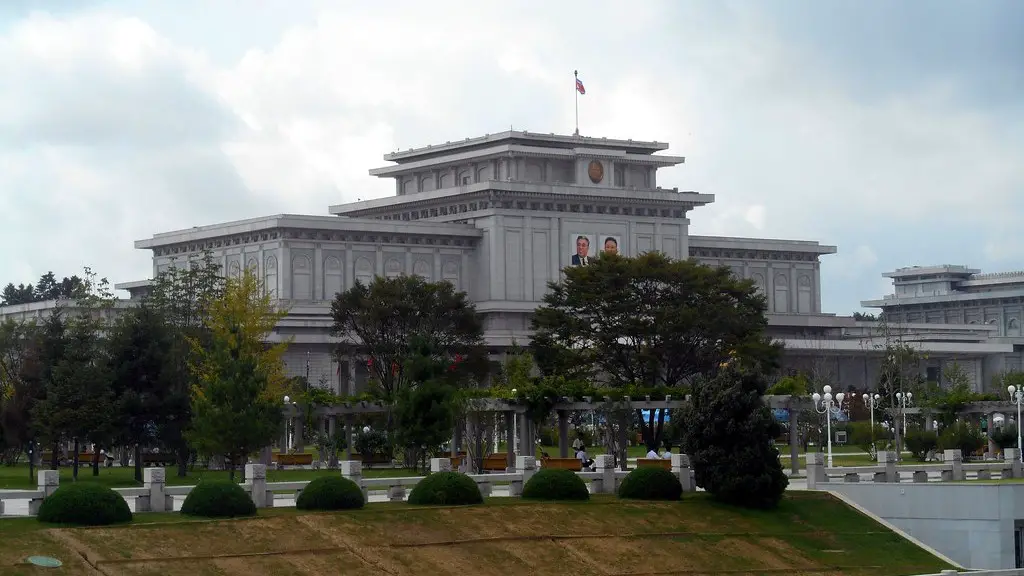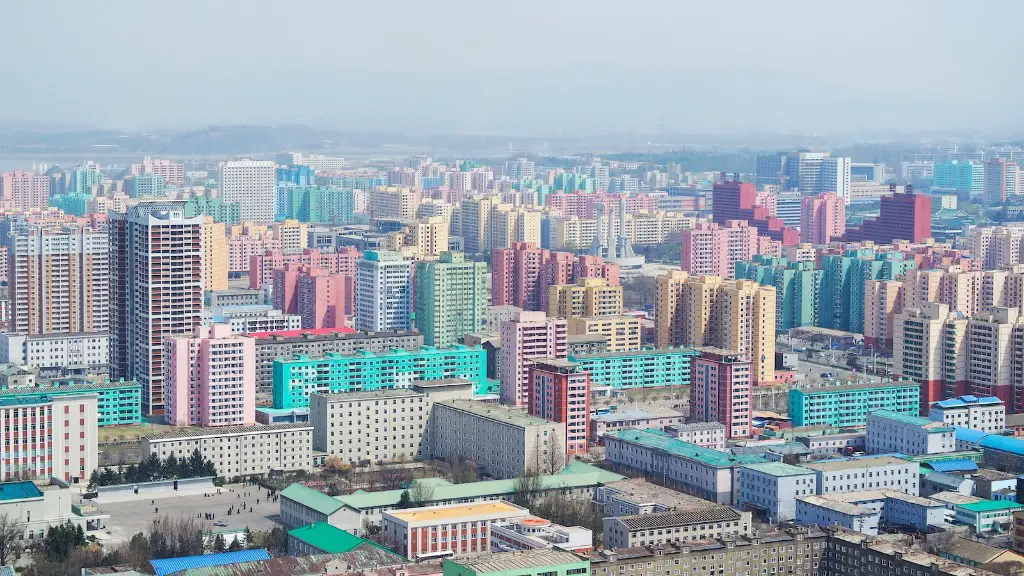How Does North Korea Affect Us?
North Korea is a land of mystery, cloaked in secrecy and often portrayed in the media as a menacing potential nuclear threat. But how does North Korea really affect us? In this article, we will explore how North Korea affects us in terms of global security, the economy, and human rights.
Security
North Korea has conducted a number of weapons tests over the past decade, including its sixth nuclear test in 2017 and its most recent test of an intercontinental ballistic missile in November 2017. These tests, combined with the unpredictability of the regime, have heightened security fears across northeast Asia. The United Nations has responded by imposing strict economic sanctions on North Korea, in an effort to curb the regime’s nuclear ambitions.
These sanctions have had devastating effects on the North Korean economy and have led to shortages of food and other basic necessities. To make matters worse, North Korea’s poor human rights record has soured its diplomatic relations with many countries, including the United States. This has made it increasingly difficult to negotiate and has made it a challenge to contain North Korea’s nuclear threats.
Economy
The effects of North Korea’s economy on China, South Korea, and Japan are well documented. China is North Korea’s largest trading partner and provides much-needed aid to the impoverished nation. South Korea’s economy is also severely affected by North Korea, as the two countries share a heavily militarized border. The tension on the Korean peninsula has caused economic uncertainty for both countries. Japan’s economy also relies heavily on trade with North Korea, making the country vulnerable to any sudden changes in North Korean policies.
Human Rights
North Korea has earned a reputation as one of the world’s most oppressive regimes. Under the rule of the Kim family, North Korea’s 25 million citizens are denied basic human rights such as freedom of expression, assembly, and religion, and political dissent is brutally suppressed. The regime has also been accused of widespread torture and ill-treatment, including the use of prison camps to incarcerate perceived enemies of the state.
The effects of North Korea’s oppressive regime have been felt around the world, as reports of human rights violations receive widespread attention. This can affect foreign investments and trade agreements with North Korea, and raises questions about the legitimacy of the regime.
North Korea’s Nuclear Ambitions
North Korea’s nuclear ambitions have become a source of regional concern, as the regime threatens to unleash its nuclear arsenal against its enemies. The Kim regime has repeatedly warned that it could use its nuclear weapons against the United States and its allies, creating an atmosphere of fear and uncertainty. It has also threatened to launch a pre-emptive nuclear strike in the event of any US aggression.
The United States and its allies have been quick to respond to North Korea’s nuclear threats, sending warships to the South China Sea in the hopes of deterring the regime. Nonetheless, recent weapons tests have demonstrated North Korea’s commitment to its nuclear program and its willingness to flout international law and sanctions.
Nuclear Proliferation
North Korea’s nuclear program has heightened fears of nuclear proliferation in northeast Asia. The regime’s refusal to abide by international laws has raised concerns that it may provide its nuclear technology to other countries in the region. This could have disastrous consequences for global stability and create a dangerous arms race.
North Korea is also believed to be the world’s most active proliferator of ballistic missile technology, exporting its missile know-how to other countries in the Middle East and South Asia. The international community has responded by imposing economic sanctions, including the United Nations Security Council’s Resolution 1718, which bans all North Korean exports.
North Korea and the United States
Relations between the United States and North Korea have been strained for decades, with the US government taking a hard line against the rogue state’s nuclear program. The US has condemned the regime’s human rights abuses and has imposed tough economic sanctions in the wake of North Korea’s nuclear tests. The US has also threatened military action if North Korea continues to develop its nuclear weapons program.
The Trump administration has taken a much harder stance against North Korea, accusing the regime of “reckless behavior.” In August 2017, President Trump threatened to “totally destroy” North Korea, in response to the regime’s ongoing provocations.
Regional Repercussions
North Korea’s provocative actions have reverberated across the region, creating tensions with its neighbors. Japan has been the most affected, with the country’s leaders calling for more robust sanctions and a stronger military presence in the region. South Korea has also taken a hard line against North Korea, with the newly elected President Moon Jae-in vowing to take a more conciliatory approach to the regime.
China and Russia, North Korea’s closest allies, have been muted in their response, preferring to rely on diplomatic solutions to the crisis. Russia has proposed a “double freeze” plan, which would see North Korea suspend its nuclear tests in exchange for the suspension of US-South Korean military exercises. China, meanwhile, has backed stricter United Nations sanctions against North Korea and has urged the regime to return to the negotiating table.
Conclusion of North Korea’s Impact
North Korea has had a profound impact on global security, the economy, and human rights. The regime’s provocative behavior and nuclear ambitions have sparked fears across Asia and beyond, and its human rights abuses have drawn international condemnation. North Korea’s actions have affected regional stability, creating tensions with its neighbors and raising the specter of nuclear proliferation. Lastly, its actions have led to the imposition of economic sanctions, which have had a devastating effect on the North Korean economy.
Understanding the Regime
To better understand North Korea and its impact, one must recognize the unique characteristics of the regime. North Korea is ruled by an enigmatic and unpredictable leader, Kim Jong-un who has refused to heed international warnings. Unlike other dictatorships, North Korea is highly isolated, lacking meaningful ties to the rest of the world. It has also developed a highly rigid socialist system that does not tolerate dissent.
The regime’s emphasis on “self-reliance” has only served to insulate it from the pressures of the international community. This has enabled the regime to pursue its nuclear weapons program without fear of repercussions. As long as North Korea remains isolated, its nuclear ambitions will remain a threat to global security.
Impact of Sanctions
United Nations sanctions have had a profound effect on North Korea’s economy, leading to shortages of food, fuel, and basic necessities. The sanctions have also made it difficult for North Korea to obtain foreign investments and do business with other countries.
However, North Korea has been able to adapt to the sanctions and has developed a network of international trading partners that provide the country with much-needed resources. This has enabled North Korea to continue its nuclear program despite the sanctions.
North Korean Defectors
The daily lives of North Korean citizens are heavily restricted, with little access to information from the outside world. Despite the risks involved, many North Koreans have opted to risk everything and escape the oppressive regime. Thousands of North Koreans have fled to South Korea in recent years, seeking a better life and freedom from persecution.
The refugees’ stories have raised awareness of North Korea’s brutal human rights abuses and have increased pressure on the international community to take action.
The Role of China
China plays a major role in the North Korea debate, as the country is North Korea’s closest ally. China provides much-needed aid and has acted as a mediator between North Korea and the international community.
Beijing has been reluctant to impose harsh sanctions on North Korea, fearing it could destabilize the region and create a flood of refugees on its border. For its part, North Korea has imposed variations of a policy of juche, or extreme self-reliance, which has made it resistant to outside influences.
International Cooperation
Despite all the divisions and chaos, international cooperation is essential to resolving the North Korea crisis. The United States and its allies must work together to find a diplomatic solution to the crisis. China’s involvement is critical in this process, and it should be encouraged to use its influence to pressure the North Korean regime to end its nuclear program.
Additionally, the international community must support efforts to improve human rights in North Korea. The pressure must come from all sides, with the UN, regional stakeholders, and citizens from around the world speaking out and taking action against the regime’s abuses. Only through collective action can we hope to bring an end to the North Korean crisis.



